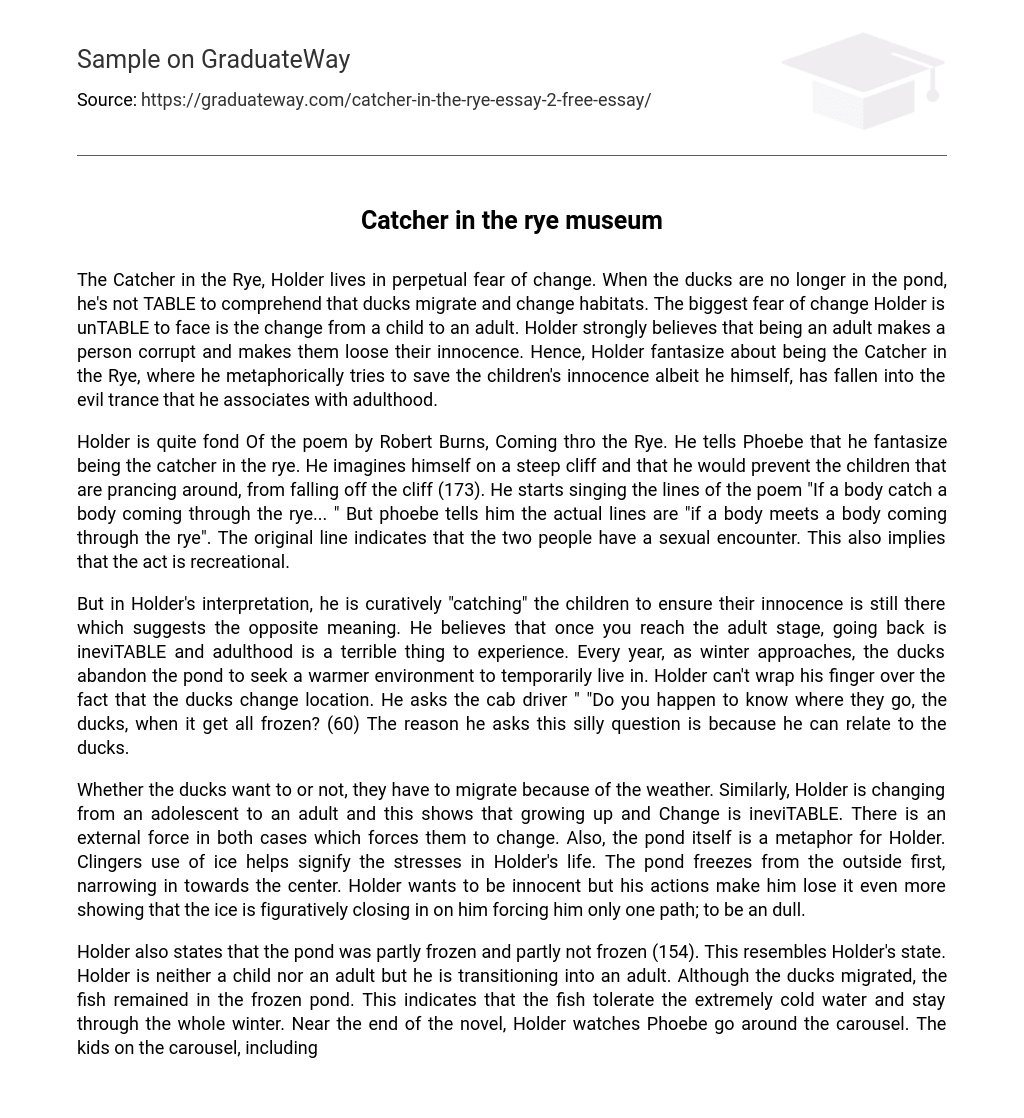The Catcher in the Rye, Holder lives in perpetual fear of change. When the ducks are no longer in the pond, he’s not TABLE to comprehend that ducks migrate and change habitats. The biggest fear of change Holder is unTABLE to face is the change from a child to an adult. Holder strongly believes that being an adult makes a person corrupt and makes them loose their innocence. Hence, Holder fantasize about being the Catcher in the Rye, where he metaphorically tries to save the children’s innocence albeit he himself, has fallen into the evil trance that he associates with adulthood.
Holder is quite fond Of the poem by Robert Burns, Coming thro the Rye. He tells Phoebe that he fantasize being the catcher in the rye. He imagines himself on a steep cliff and that he would prevent the children that are prancing around, from falling off the cliff (173). He starts singing the lines of the poem “If a body catch a body coming through the rye… ” But phoebe tells him the actual lines are “if a body meets a body coming through the rye”. The original line indicates that the two people have a sexual encounter. This also implies that the act is recreational.
But in Holder’s interpretation, he is curatively “catching” the children to ensure their innocence is still there which suggests the opposite meaning. He believes that once you reach the adult stage, going back is ineviTABLE and adulthood is a terrible thing to experience. Every year, as winter approaches, the ducks abandon the pond to seek a warmer environment to temporarily live in. Holder can’t wrap his finger over the fact that the ducks change location. He asks the cab driver ” “Do you happen to know where they go, the ducks, when it get all frozen? (60) The reason he asks this silly question is because he can relate to the ducks.
Whether the ducks want to or not, they have to migrate because of the weather. Similarly, Holder is changing from an adolescent to an adult and this shows that growing up and Change is ineviTABLE. There is an external force in both cases which forces them to change. Also, the pond itself is a metaphor for Holder. Clingers use of ice helps signify the stresses in Holder’s life. The pond freezes from the outside first, narrowing in towards the center. Holder wants to be innocent but his actions make him lose it even more showing that the ice is figuratively closing in on him forcing him only one path; to be an dull.
Holder also states that the pond was partly frozen and partly not frozen (154). This resembles Holder’s state. Holder is neither a child nor an adult but he is transitioning into an adult. Although the ducks migrated, the fish remained in the frozen pond. This indicates that the fish tolerate the extremely cold water and stay through the whole winter. Near the end of the novel, Holder watches Phoebe go around the carousel. The kids on the carousel, including Phoebe, were tying to grab the gold ring. Even though phoebe could’ve fallen off, Holder remained still.
He said “If they want to grab or the gold ring, you have to let them do it, and not say anything. If they fall off, they fall off, but it’s bad if you say anything to them” (211). Holder finally accepted the fact that he cannot protect the children from changing into an adult. Holder can be associated with the fish in the pond who stay through all the hardships adulthood may present. He know understands that the children will lose their innocence at some point and that he cannot prevent that from happening. Holder started to realize he cannot be the catcher in the rye because he himself has fallen of the cliff. When Holder chats with Mr..
Anatolian, Mr.. Anatolian warns him “This fall I think you’re riding for?it’s a special kind of fall, a horrible kind” (187). The “fall” Mr.. Anatolian is referring to is Holder’s inability to realize things change and people grow up. Holder is caught up in the idea that adulthood is evil and shady. If Holder realizes that growing up is ineviTABLE, then only he would be TABLE to see growing into an adult isn’t necessarily considered “falling’. While Holder wants to protect people?s innocence, he has failed to do so when his classmate, James Castle, committed suicide wearing Holder’s sweater; “He had on the turtleneck water I’d lent him” (170).
The fact that Castle fell to his death wearing Holder’s sweater suggests that Holder himself is falling. Though he aspires to be the catcher in the rye, he is falling, in the sense that he is changing into an adult. Holder had been preoccupied by the idea of protecting the children’s innocence but he’s failed to do so in this case. Holder slowly comes to the realization that it is nearly impossible for him to be the Catcher in the Rye which he aspired to be. Holder is perturbed by the “F you” sign written on Phoebe’s school’s wall (201 He assumes a “perverts bum” wrote that (201).
What he doesn’t realize, is that a kid who goes to the school most likely vulgarize the wall. He believes that children are innocent and that adults are the ones who are corrupt. The idea of growing up seems foreign to Holder. But he later comes to realize that the children are growing up, and they may use profanity to signify their “immatureness” though they are in elementary school. . Holder believes that any sexual act with a person he truly cares for isn’t an act Of intimacy because he thinks that it makes women seem like property. Holder’s views make him seem immature in terms Of adult sexuality.





